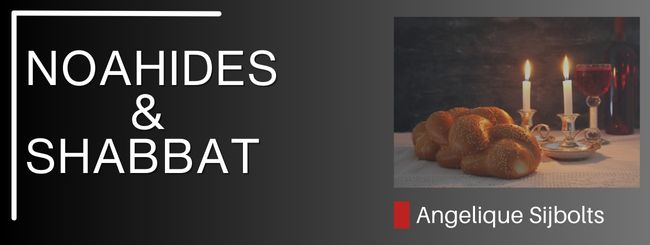בס”ד
A Covenant Between G-d and the Jewish People
Shabbat is first mentioned in Genesis 2:2-3:
| On the seventh day G-d finished the work that had been undertaken: [G-d] ceased on the seventh day from doing any of the work. | וַיְכַ֤ל אֱלֹקים֙ בַּיּ֣וֹם הַשְּׁבִיעִ֔י מְלַאכְתּ֖וֹ אֲשֶׁ֣ר עָשָׂ֑ה וַיִּשְׁבֹּת֙ בַּיּ֣וֹם הַשְּׁבִיעִ֔י מִכָּל־מְלַאכְתּ֖וֹ אֲשֶׁ֥ר עָשָֽׂה | |
| And G-d blessed the seventh day and declared it holy—having ceased on it from all the work of creation that G-d had done. | וַיְבָ֤רֶךְ אֱלֹקים֙ אֶת־י֣וֹם הַשְּׁבִיעִ֔י וַיְקַדֵּ֖שׁ אֹת֑וֹ כִּ֣י ב֤וֹ שָׁבַת֙ מִכָּל־מְלַאכְתּ֔וֹ אֲשֶׁר־בָּרָ֥א אֱלֹקים לַֽעֲשֽׂוֹת |
This verse shows that the divine rest of Shabbat belonged to God Himself; there is no mention that Adam (or humanity) must observe this day in any way. Therefore, we do not find examples in the Tanakh of people observing Shabbat until Exodus 16:23, which states:
This is the first ‘work prohibition’, so to speak, and it teaches the people of Israel that they do not have to expect manna on Shabbat because they are not allowed to prepare food on that day. This serves as preparation for what we read in Exodus 31:12-17:
We see in the above verses that Shabbat is a sign between God and the Jewish people. Shabbat and the Torah are specifically given to the Jewish people, and although non-Jews must live morally and ethically according to the Noahide laws, they may not introduce new religious practices that deviate from the seven Noahide laws. This is called the prohibition of “Chiddushei Dat,” similar to the Jewish concept of “Baal Tosif,” which prohibits Jews from adding new commandments to the Torah.
Maimonides teaches in “Kings and Wars” 10: 9-10 that a non-Jew who delves into the Torah and studies it at a level beyond the Noahide Code, which includes only the seven Noahide laws, is obligated to die. This also applies to resting on a day, even if it is not Shabbat, or celebrating a festival in a manner similar to Shabbat. It is important to emphasize that this punishment is not intended to be literally carried out by a court, but rather as a warning of the seriousness of the act. It is also important to note that this is not a legal punishment carried out by humans, but rather a divine consequence.
The prohibition on non-Jews observing Shabbat is derived from Genesis 8:22, which states:
Reis Lakish explains that day and night shall not cease should be read as a command for non-Jews to constantly be involved in the world and not to observe a day of ritual rest.
Observing the Significance of Shabbat as a Noahide
However, it is permitted, but not obligatory, for a Noahide to mark the significance of Shabbat in certain ways, without making it a religious obligation or ritually abstaining from productive activities. It is good, however, to have intellectual recognition that God attaches special significance to Shabbat as the Seventh Day of Creation. This recognition also serves as a counterbalance to secular views on the origins of creation.
Some ways in which a Noahide can mark the Sabbath without violating the Noahide laws include:
- Resting for physical relaxation, taking a day off from work if permitted by the employer, or taking a vacation.
- Having a special meal after sunset on Friday and/or during the day on Saturday, with the option to light candles on the table to enhance the meal. However, one should not recite the Jewish blessing over the candles.
- Wearing nice clothing.
Other suggestions for ways in which a Noahide can mark the Seventh Day include:
- Spending extra time learning appropriate Torah subjects and prayers.
- Spending extra time with family to strengthen bonds of love and dedication to Torah-true Noahide values.
By Angelique Sijbolts
Text: Sefaria.org
See also the Shiur of Rabbi Tani Burton : CAN NOAHIDES OBSERVE SHABBAT?
Sources:
The Noahide Laws by Yeshiva Shoshanim
Article from AskNoah: How Noahides should relate to the Seventh Day (Saturday)
© Copyright, all rights reserved. If you enjoyed this article, we encourage you to distribute it further.
Our blogs may contain texts/ quotes/references/links of
Mechon-Mamre.org, Aish.com, Sefaria.org, Chabad.org AskNoah.org
that contain copyrights and which we may use with there permission.
